The financial advice profession has often fallen short when it comes to serving young people, people of diverse backgrounds and low-net-worth households. That’s because one of the longtime draws of financial advice is earning above-average income by offering services to the wealthy. But younger advisors today see more than that—they see opportunities serving those groups who aren’t being served.
“I wanted to start with young professionals in a certain part of their careers where they could afford to pay a planning fee,” says Luis F. Rosa, of Build a Better Financial Future, about his goals when starting his own firm. “People early in their careers who are still accumulating have a great opportunity to make all the right decisions for their future.”
Many of Financial Advisor’s 2019 Young Advisors to Watch have found the traditional wealth management industry stuck in old ways of doing business—committed to archaic revenue models, dependent on outdated technology and focused on client segments that are too narrow.
They want to work instead with younger clients—using a revenue model those clients can afford and understand in their early careers. Nor do younger advisors want to be held back by too much internal oversight. They want to be able to blog, text, tweet and chat with their peers freely.
Others want to be more visible to people like themselves—people of color, people in the LGBTQ community—both to serve them and inspire them to pursue planning careers.
“If you want to diversify the profession and bring in a more diverse population, work on responding to the people of color you want to serve,” says Pamela Capalad, founder of Brunch & Budget. “You need to make a workplace where a person of color would want to stay. I’ve heard so many people say that they had to leave their firm because they felt tokenized.”
Even the culture of competition turns these advisors off—they want to collaborate openly with other professionals. Some have eschewed the suits and ties, others avoid investment management altogether.
To address the problems they’ve seen in the business, the young advisors profiled here took personal risks to start their own businesses—sometimes taking pay cuts to serve their desired clientele.
Kathleen Boyd, a Ph.D. candidate at Kansas State University, says the change in advice will mean everything to millennials facing crisis—”the ones saddled with student loan debt hampering our abilities to max out our retirement accounts, hampering our ability to buy a home.” This is about the larger economy, too. “It is becoming imperative that we help the millennial generation with financial education … but behavioral change as well.”

Tyrone Ross Jr., 39
Managing Partner / NobleBridge Wealth Management / Montclair, N.J.
Young advisors should be willing to take chances and expand their expertise—that’s how Tyrone Ross differentiated himself from his peers.
Ross has specific expertise working with clients who own cryptocurrencies in their portfolios, as well as delivering advice to clients with start-up businesses.
“Cryptocurrencies are the future, and the future is coming,” says Ross. “It’s better to be excruciatingly early than painfully late. I had no choice. My clients were like ‘We own it, you figure it out.’ But I don’t pitch it. I don’t say that they should add a portion of it to their portfolio. People ask about it, and I help them guide their education around it.”
After studying communications, Ross took positions at several traditional firms before joining NobleBridge serving younger clients. He has no asset minimum and offers subscription, hourly, retainer and AUM-fee services.
Developing a specific expertise and finding a niche are existential necessities for advisors of color, he says.
“You’re at an inherent disadvantage if you’re a generalist,” says Ross. “You can’t go target a specific segment. You face high hurdles if you’re a 6’ 2” black male and you walk into the home of a 60-year-old white male and try to relate to him and speak to the things that might not be common or familiar to both of you. If you call people and you say your name is Tyrone, they suggest that you change your name.”
Ross decries the lack of representation in the industry; to combat the problem, he spends some of his spare time going into inner city schools and speaking to young people about personal finance and the financial professions.
Just seeing a successful black man in the financial industry helps children, he says, because many of them don’t know the career exists.
“I didn’t know what a financial advisor was until I was 26. More advisors like myself need to be seen and visible.”
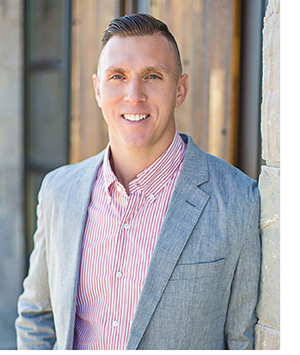
Justin Castelli, 37
CEO, Financial Advisor / RLS Wealth Management / Fishers, Ind.
Justin Castelli in the past worked for a 403(b) provider, a bank and an insurance firm. But his frustrations with sales and product goals, and his passion for creating educational content online, prompted him to look elsewhere in the industry for satisfaction.
“I also wanted to have a blog and to create my own content,” he says, “and being on the independent side would allow me to do that.”
Castelli founded RLS Wealth Management to serve financial advice to young entrepreneurs and clients in or near retirement. While he serves traditional wealth management clients with an AUM revenue model, Castelli also offers WealthFusion, a subscription-based model where clients pay $150 a month for financial planning.
He also writes and records “All About Your Benjamins,” a blog and podcast, and is active in social media’s “FinTwit” community.
“We should encourage people to put themselves out there as advisors, tell their stories and create their own brands,” says Castelli. “I’ve had a lot of conversations with young advisors wanting to go independent, start a blog and a podcast, but because of the firms they’re at today, their compliance departments will not allow them to do that.”
Recently, he found himself in a position of influence within FinTwit after co-organizing the first national meet-up of that community. “People are coming from 21 cities. We have someone from over in Europe who is flying in. We’re sharing ideas, having open conversations on Twitter. It’s positive for our industry.”
Young independent advisors do not see one another as competitors, says Castelli. That allows them to collaborate and form communities and friendships. He maintains online study groups and regularly scheduled conference calls with others to share best practices with them and discuss the profession.
Castelli has also started RLS Threads, an online store with advisor and FinTwit-themed clothing. It donates a portion of its sales to financial literacy programs.
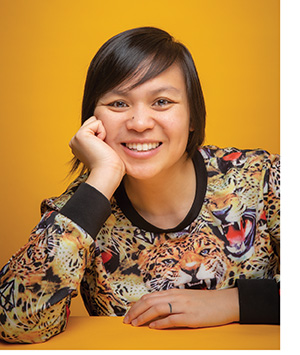 Pamela Capalad, 33
Pamela Capalad, 33
Founder, Financial Advisor / Brunch & Budget / Brooklyn, N.Y.
About five years ago, when she was hanging out with her peers at a party, one of Pamela Capalad’s girlfriends asked for advice.
“She didn’t know her credit score, had no budget, no savings,” recalls Capalad. “I asked her if she wanted to work on it over brunch, and she said, ‘Oh my God, like a brunch and budget.’”
“Brunch & Budget” eventually became the name of Capalad’s firm, which now has more than 70 monthly clients. Its success can in part be attributed to Capalad’s drive to create a less intimidating, more approachable financial planning practice.
Her first meetings with clients are held on a "pay what you can" basis and are usually held over brunch at a place of the client’s choosing (hence the name) or else held virtually.
“Meeting over brunch gave us a common ground, a place to break bread and know each other, have the conversation and remove the pretense of ‘You shouldn’t be doing this’ and ‘Why aren’t you doing this yet?’” says Capalad. “This whole idea that you’re behind and need to catch up, that’s what stresses people out and makes people worried or not even want to think about finances.”
Brunch & Budget charges its clients on a sliding scale depending on their income, not assets under management.
Another 60 clients are in an affiliated financial planning program called “See Change” run by Capalad and her husband and designed to financially empower people of color.
“The idea is also to make the service more affordable and to build a community around people of color, having conversations around the emotional side of money, family obligations, pressure and sacrifice,” says Capalad. “As these clients are usually the first ones [in their families] who go to college, get a salary job and make six figures, they’re the ones able to support their family, and they come under a lot of pressure. It’s become a significant part of my business.”
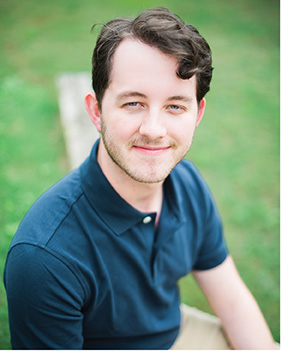 Ian Bloom, 26
Ian Bloom, 26
Owner, Financial Life Planner / Open World Financial Life Planning / Raleigh, N.C.
Ian Bloom is a nerd—so his independent financial planning firm Open World Financial Life Planning embraces nerd culture not only in its clientele, but its name as well.
An open world game is a video role-playing game where players can literally do anything they want within a large, open playing map—the game puts few, if any, limitations on where they can go and what they can interact with.
“Ultimately, the thing that resonated with me about the name and the games is that when you walk into them, it’s tabula rasa—you can follow the main quests, or invent an entire other purpose for your character,” says Bloom. “Completing a quest always leads to something else—the work that you do is transformational. It has a lot of parallels with planning.”
In keeping with his theme, Bloom has turned to conferences like Comic Con, gaming groups and local tech meet-ups to prospect for clients. He also markets his services with a weekly video series linking a gaming concept with a financial concept.
Nerds are desirable as clients, says Bloom, because they’re naturally curious and enthusiastic people. They also occupy more influential and important positions in the culture and the economy than they once did—many of Open World’s clients are high-earning software engineers and other technology professionals.
“Right now, most of the top earners at my age have computer science degrees,” he says. “They’re not going and getting business degrees anymore. Most of the wealthy younger people I know went to work for Microsoft or Apple or Google or Amazon. I think we’re in a little bit of a geek and nerd renaissance.”
These clients may have different ideas about their careers and retirement, with designs on early retirement or partial retirement before the age of 65.
Bloom also serves as NexGen Director of the FPA of the Triangle, the Raleigh-region chapter of the FPA.
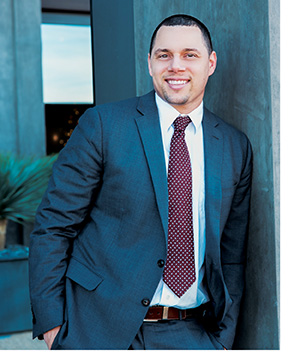 Luis Rosa, 39
Luis Rosa, 39
Founder / Build a Better Financial Future / Las Vegas
When Luis Rosa came to the U.S. from the Dominican Republic in the early 1990s, he was 11 years old and didn’t speak English fluently, nor did his family.
Even after they learned the language, however, the family lacked financial literacy. As Rosa prepared to attend college, he realized that a shortfall in financial knowledge was holding his family—and the Dominican community—back.
“My parents never had life insurance, never owned a credit card, never had a car,” he says. “They had nothing to teach us about finances except to work hard and save money. My generation was the first one who went to college. We were the first ones to get jobs that offered a 401(k). Our parents couldn’t teach us any of this stuff.”
He wanted to put that information out there himself for others to learn, and he feels a certain urgency to offer young adults financial advice and planning as early as possible. That’s why his firm doesn’t have asset or income minimums, and does not sell investment products.
He has a “barbell” approach to clientele, serving both young professionals paying flat planning fees and wealthier retirees and near-retirees paying AUM fees. He prospects for the former via social media, while hosting monthly retirement seminars to find the latter.
Because Spanish is his first language, Rosa is among a small community of independent advisors offering bilingual financial planning services. He’s also incorporated tax planning into his practice.
“I do tax planning because I feel like there are a lot of opportunities missed,” he says. “Most people, if you read their disclosures, say ‘We do not provide tax advice,’ but I feel like if you provide financial advice you truly are tax planning. You’re talking to people about rolling things over, selling assets—and by the time people get to tax season and sit down with their accountant, chances are good they’ve already done something detrimental to their tax situation.”
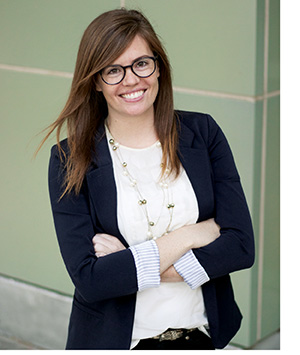
Leighann Miko, 35
Financial Advisor / Equalis Financial / Los Angeles
Many financial professionals recognize that affluent LGBTQ households often make attractive clients, but Leighann Miko, founder of Equalis Financial, argues that the industry is more interested in serving the community’s assets than lesbian, gay, bisexual, transgender and queer people themselves.
For example, professional tools are poorly designed to provide plans for LGBTQ couples.
“Just about every financial planning software I have used leaves a lot to be desired when it comes to output and deliverables,” says Miko. “At this point, I have a template written in plain English that I created and just fill in information as it pertains to each client. If my clients can’t understand or follow the plan I hand them, what good is it?”
Miko says that planning software also fails her younger clients because it often omits basic functions like running monthly cash-flow analyses, long-term debt management and simulating a goal of building an emergency fund.
In order to better serve younger clientele, Miko steers clear of asset minimums at her firm and has adopted a flat-fee revenue model alongside her AUM fees.
“We have an opportunity to shape and mold the financial habits and behaviors of young people, which will no doubt allow them to achieve financial success with more ease and make them ideal clients over their lifetime,” says Miko. “More advisors need to be willing to offer this type of service.”
Miko says that it helps to understand that even as the legal lines between traditional and queer relationships are being dismantled, the LGBTQ community still faces challenges and concerns unique to their identities.
Miko has dedicated herself—and her practice—to addressing the inequities between people of different backgrounds and promoting social and economic justice. “Not everyone is born with the same privilege, and though hard work can lead to success, it is certainly not equal opportunity.”
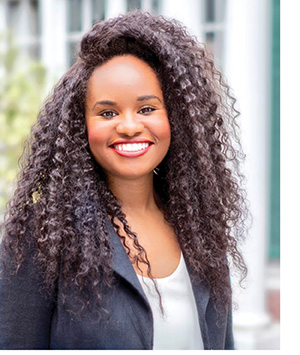
Kathleen Boyd, 33
Doctoral Student, Instructor / Kansas State University / Long Beach, Calif.
After dropping out of high school and later enrolling in a community college, Kathleen Boyd originally pursued a four-year degree as an architecture major. But she eventually found a calling in financial planning instead, particularly in addressing clients’ money-related behavioral issues.
She began as an investment manager on the private banking side of the business, but found that she preferred working directly with clients to help solve their financial problems.
Today, she teaches personal finance as she continues her education; she’s developing Oklahoma State University’s first course dedicated to diversity and financial issues, and conducting research in the realm of financial therapy. She is also preparing to join a new firm later in the year.
Boyd’s interest in behavioral finance and financial therapy stems, in part, from her upbringing.
“My parents did not have a formal education: Mom was a high school dropout, my biological dad was a high school dropout, my stepfather had some college but dropped out,” says Boyd. “No one had education around financial literacy and how to manage money, and that resulted in a lot of negative things that happened in my childhood, like the evictions and being homeless.”
Boyd is founder of the Long Beach Financial Planning Day, which offers free one-on-one financial consultations in the city.
Boyd, whose Twitter handle is @queerfinancier, is also an outspoken advocate for improving diversity and inclusion within the financial industry. She says the industry needs to take an honest look at its hiring practices, right some of the wrongs and give people of color a chance in the profession.
“I get so many e-mails and phone calls from young advisors of color trying to get their foot in the door in this profession. They wonder ‘What is wrong with me?’ The truth is that they’re not doing anything wrong. They’re still dealing with biases, discrimination and racism when it comes to hiring.”
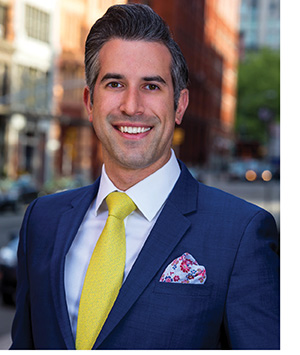
Douglas Boneparth, 34
Founder, Financial Advisor / Bone Fide Wealth / New York
Like many young advisors, Douglas Boneparth found his way to the profession through family: His father Andrew Boneparth has practiced for 36 years in their hometown of Boca Raton, Fla.
At age 24, the younger Boneparth set out for New York to partner with another advisor (Boneparth’s wife was also there). He also enrolled in NYU’s MBA program.
“That was in October 2008, right as the sky started to fall and the Great Recession set in,” says Boneparth. “That provided me with some of the early lessons of my career. I learned how to handle clients that were pretty scared.”
Boneparth found his ideal clients among NYU’s graduate students: high-achieving young professionals. Yet he faced an obstacle—the millennial professionals had plenty of income, but they had few investable assets and were saddled with high levels of student loan debt. The financial firms Boneparth worked for were poorly suited for such clientele.
Last year he founded Bone Fide Wealth, adopting a flexible revenue model to better serve professionals in the early stages of their careers. His clients can opt for subscription-based services, flat-fee financial planning, an AUM fee-based relationship or some sort of hybrid model.
Bone Fide Wealth requires no minimum investments or assets. In fact, the first investments Boneparth discusses with clients are usually not financial instruments, but ways that they can invest in themselves to expand their skills and boost their incomes.
“The greatest investment you could ever make is the investment in yourself,” he says. “Those are the people I’m looking for, the ones who want to invest in themselves.”
He’s also become an advocate for millennial financial literacy, co-authoring a book called The Millennial Money Fix with his wife and volunteering with W!SE, a New York-based nonprofit focusing on financial education, college and career readiness, and services to students and adults.
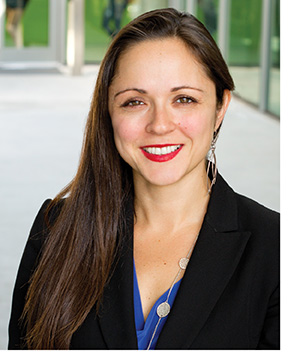
Julia Wiss, 35
Founding Partner, Financial Advisor / Lumen Wealth Group / Manhattan Beach, Calif.
Born in Moscow, Julia Wiss has a career influenced by her immigrant’s experience—she has a strong work ethic and empathizes with clients struggling with confidence or poor financial literacy.
“When I was younger, I was in a new country with a new language, a new culture and new traditions—I really had to get a grasp on it,” says Wiss. “That carries over now because I have to make sure that I don’t speak over anyone or assume that people know things. I educate and explain things very clearly. Money is not a scary, complicated thing; it’s something they can very much execute on and get excited about.”
In just the last 18 months, she and her two partners founded Lumen Wealth Group and grew it to 180 client relationships. The firm focuses on professional women, business owners and college professors. Since many of these clients have not accumulated a large pool of assets yet, Wiss and her partners offer a subscription financial planning service for $150 a month.
She set up her own shop after a stint in leadership at Waddell & Reed. Her leadership role there meant giving up her book of business.
“I found coaching advisors to be fulfilling … but I started to miss client interactions and client impact,” she says. “I missed helping others.”
One of her goals is to help women demystify their finances. In her own childhood home, financial information was taught to both sexes, and she was surprised to encounter women with little knowledge of their household finances.
“I would meet women who would say, ‘My husband is taking care of things,’ and their husband wouldn’t share with them anything about money,” Wiss says. “I started working with women going through divorce, or whose husband passed away, who had no clue about money. They were paralyzed from not knowing anything about their own finances.”
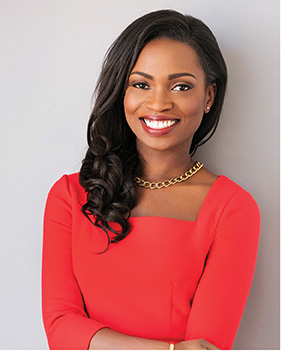 Kaya Ladejobi, 34
Kaya Ladejobi, 34
Founder and Financial Advisor / Earn Into Wealth Strategies / New York, N.Y.
Like many of this year’s young advisors, Kaya Ladejobi had to start her own firm and business model to serve young professionals. The workplace she wanted did not exist.
“I wanted a firm that catered to people in their 30s and 40s who were earning a high income but did not have assets yet,” she says. “That required a business model not based on AUM, that was focused on advice, that gave people the opportunity to opt in to whether or not they wanted to be advised on their investments.”
Hence the name of her firm, Earn Into Wealth Strategies. The business is focused on millennials and addresses their greatest financial asset: their great ability to earn over the coming years.
Ladejobi’s clients often come to her with questions about financing a first home purchase, workplace benefits and salary negotiations.
“A lot of people who don’t talk to their colleagues about money may be comfortable with what they earn and not realize they’re underpaid,” she says. “I bring it up in client meetings: ‘This is the job you have. I know others who have that job and know how much they are paid. You have 10 years of experience.’ I ask them, ‘When was the last time you asked for a raise?’”
Her firm is virtual (not fixed in location), which is key to serving young professionals, she says. “A lot of my clients travel to work, they have young children or they’re in dual-career couples. It is challenging for them to show up in person.”
Another goal she has is to support other women of color in the financial planning profession, perhaps by launching scholarships.
“I would like to sponsor two or three women of color annually to take the CFP exam and give them the opportunity and remove the cost as a barrier to them.”
Photographs courtesy of financial advisors. Photograph of Pamela Capalad by Bill Bernstein.









